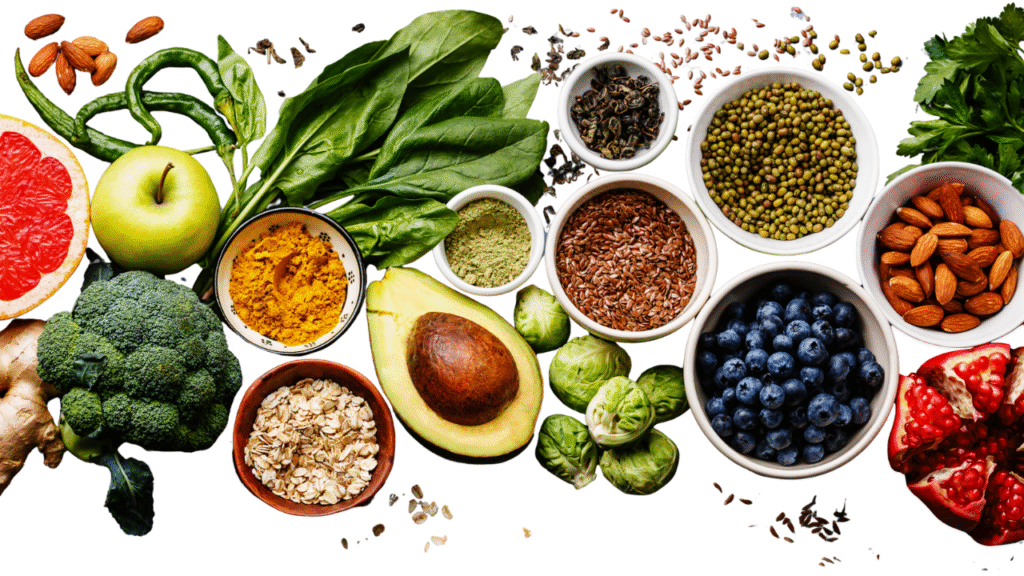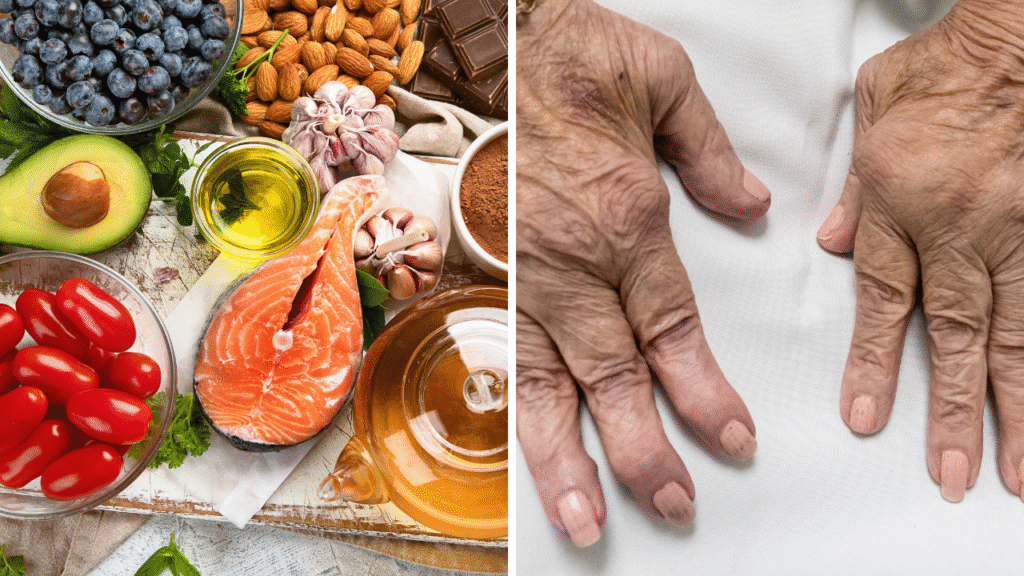

Grapes are a versatile and nutritious food item in various colors and styles, including seeded and seedless. They are appreciated for their winemaking abilities, delightful snack value, and high nutrient and antioxidant content. Most grapes belong to the Vitis vinifera family and are packed with antioxidants, making wine a heart-healthy choice. Fresh grapes are an excellent snack with their natural sweetness and a dose of vitamins C and K. Incorporating grapes into your diet can provide several health benefits.
Here are 16 Health Benefits of Grapes.
1. Packed with nutrients
Grapes contain many critical minerals, including copper, vitamin K, thiamine, riboflavin, and B6. A cup of red or green grapes contains:
- 104 calories.
- 27 grams of carbohydrates.
- 1 gram of protein.
- 0.2 grams of fat.
- 1.4 grams of fiber.
- 21% of the dietary value (DV).
Vitamin K is necessary for proper blood coagulation and bone health. Grapes also include B vitamins such as thiamine, riboflavin, and B6, all essential for growth and development. Potassium accounts for 6% of the daily value, while vitamin C accounts for 5%. Overall, grapes are an excellent source of vital vitamins and minerals.
2. High in antioxidants
Antioxidants, the essential chemicals that repair free radical damage, are abundant in grapes, particularly in the skin and seeds. The concentration of these antioxidants varies based on grape varietals, ripeness, post-harvest storage, and environmental factors. These beneficial molecules persist even after fermentation, making wine a surprising source of antioxidants. Grapes also contain anthocyanins, which may help prevent brain and heart problems, and other vital antioxidants like resveratrol and quercetin, which may protect against heart disease, excessive blood sugar, and cancer. With potent antioxidants like vitamin C, beta-carotene, lutein, and ellagic acid, grapes are a natural shield against chronic health disorders. 2
3. It may benefit eye health.
Grapes include plant chemicals that may help prevent common eye problems. According to studies, grapes can prevent retinal damage in mice and increase retinal function. Resveratrol in grapes protects retina cells from UVA light, which may reduce the risk of age-related macular degeneration (AMD). It may also help prevent glaucoma, cataracts, and diabetic eye problems. Grapes also include the antioxidants lutein and zeaxanthin, which promote eye health, increase visual function, and protect against age-related eye illnesses. Overall, grapes may be good sources of antioxidants.
4. It may aid heart health.
Grapes have potential health benefits for heart health. One cup of grapes contains 6% of potassium’s daily value (DV), which is essential for maintaining healthy blood pressure levels. Potassium helps lower blood pressure by dilatation of arteries and veins, excretion of sodium, and preventing the narrowing of arteries and veins. However, too low or too high potassium intake can lead to high blood pressure. Researchers recommend a daily potassium intake of 4.7 grams. Grapes also contain compounds that may protect against high cholesterol levels by decreasing absorption. A study found that eating 3 cups of red grapes daily helped lower total and LDL cholesterol levels in 69 people with high cholesterol. Additionally, diets high in resveratrol, an antioxidant in grapes, such as the Mediterranean diet, have been shown to decrease cholesterol levels. 4
5. It may have anticancer effects.
Grapes include antioxidants such as resveratrol, quercetin, anthocyanin, and catechin, which may help prevent cancer. Grape extracts have been demonstrated in laboratory and animal tests to inhibit the growth and spread of human colon and breast cancer cells. A two-week study of 30 adults discovered that those over 50 who consumed 0.3–1 pound of grapes per day had lower markers of colon cancer risk. A diet rich in antioxidants like grapes has been linked to a lower cancer risk. While more human research is needed, the antioxidants found in grapes may inhibit the growth and spread of certain forms of cancer. 5
6. It may improve memory, attention, and mood.
A 12-week study of healthy older adults revealed that grapes improved memory and brain health. A daily grape supplement of 250 mg dramatically enhanced attention, memory, and language test results. Drinking grape juice also boosted mood and memory 20 minutes after ingestion. In rats, resveratrol consumption improved learning, memory, and mood, increasing growth and circulation. Resveratrol may also protect against Alzheimer’s disease by lowering brain inflammation and eliminating the amyloid-beta peptide, which is associated with the disorder. Grapes include chemicals that can improve memory, attention, and mood.
7. It may protect against diabetes and lower blood sugar levels.
Despite their high sugar content, Grapes are a safe choice for people with diabetes due to their low to moderate glycemic index (GI). The GI ranges between 49 and 59, depending on the grape type; thus, the concept of low GI differs. Grapes may cause blood sugar levels to rise gradually or moderately, but they will not necessarily jump. However, excessive eating of low-GI meals can have the same impact on blood sugar levels as high-GI foods. Grapes and grape supplements have been shown to dramatically reduce the homeostatic model assessment of insulin resistance (HOMA-IR), a measure of insulin resistance. Resveratrol may improve insulin sensitivity, reduce resistance, protect pancreatic beta cells, boost insulin production, and increase glucose receptors on cell membranes. Managing blood sugar levels over time is critical for lowering diabetes risk and avoiding complications.
8. It may support bone health.
Grapes include vital minerals such as potassium, manganese, and vitamins B, C, and K, which aid in preventing osteoporosis, a disorder characterized by weak bones. Resveratrol has been found to promote bone density, with rats fed freeze-dried grape powder demonstrating more excellent bone absorption and calcium retention. A two-year study in postmenopausal women discovered that consuming 75 mg of resveratrol twice daily increased bone mineral density and delayed bone loss, lowering the incidence of major fractures and hip fractures. However, further human-based research is required.
9. May lower inflammation
Chronic inflammation contributes significantly to the development of long-term health issues such as cancer, heart disease, diabetes, arthritis, and autoimmune disorders. Grapes include anti-inflammatory chemicals such as anthocyanin and resveratrol, which can reduce the expression of inflammatory markers such as TNF-alpha and IL-6. However, little research on grapes suggests they may possess anti-inflammatory effects protecting against chronic illnesses.
10. It may protect against bacteria and fungi.
Grapes include chemicals that can protect against hazardous microbes, including resveratrol, which inhibits the growth of bacteria and fungi such as Campylobacter jejuni and Candida albicans. It also helps to prevent food-borne infections such as E. coli. Other antibacterial chemicals in grapes include anthocyanins, which damage bacterial cell walls. Grapes are also high in vitamin C, which is linked to improved immunological function. Grapes contain a variety of chemicals that can have a positive impact on dangerous germs and fungi.
11. It may slow signs of aging and promote longevity.
Grapes contain plant chemicals that are known to influence aging and lifespan. Resveratrol, found in grapes, may delay the onset of aging by imitating the benefits of calorie restriction, such as lowering oxidative stress, increasing stress tolerance, and boosting the inflammatory response. However, these benefits have only been seen in animal studies. Resveratrol also activates the SirT1 gene, which is associated with longer lifespans, and sirtuin, a protein that controls cellular processes such as aging and cell death.
12. It may have anti-obesity effects.
Obesity raises the risk of a variety of medical disorders, including diabetes, heart disease, and cancer. Grapes contain anthocyanins, which may have anti-obesity properties by inhibiting body weight increase and lowering liver fat content in rats on a high-fat diet. Grape seed proanthocyanidin extract may enhance GLP-1 levels, reducing hunger and food consumption. However, human research on these antioxidants is scarce.
13. It may benefit skin and hair health.
Resveratrol, an antioxidant in grapes, has benefitted several skin and hair. It penetrates the skin’s barrier, boosts collagen levels, and protects against UV damage. Animal studies suggest that resveratrol’s effect on collagen formation may improve wound healing. Furthermore, studies indicate that resveratrol may increase hair development by decreasing oxidative stress and inflammation, which lead to hair loss. However, further research is required to completely comprehend the impacts of grape consumption on skin and hair health.
14. May support sleep
Research shows a clear link between diet and sleep, and grapes are a natural source of melatonin, a sleep-promoting hormone that governs the sleep-wake cycle. Melatonin is found largely in grape skin, but it is also present in grape juice and wine. Grapes should be consumed early in the evening to promote sleep quality since they function with the body’s internal clock.
15. May relieve constipation
Reduced stool frequency and inadequate evacuation are two symptoms of the common condition of constipation. Treatment consists of dietary adjustments such as boosting fiber and fluid consumption, as dehydration is a major secondary cause. Grapes, a fiber-rich whole fruit, can considerably reduce constipation symptoms by boosting fecal weight and daily bowel movements. Grapes also contain 81% water, making them an excellent hydration source.
16. Easy to add to your diet
Grapes are a versatile and healthful snack that may be enjoyed on their own, mixed with spinach, cucumber, banana, kale, and mint to make a nutrient-rich smoothie, served on yogurt with crushed almonds and honey, frozen for a cool summer treat, or tossed into salads. For a sweet treat, you can also serve them with sliced apples, strawberries, and dark chocolate. Grape juice and red wine, consumed in moderation, can also be beneficial.
Fresh grapefruit vs. grape juice
Grapes and grape juice are both nutritious; however, the whole fruit is generally healthier due to a 44% reduction in antioxidant content during preparation. Fruit juices also have little to no fiber and are high in sugar. Whole fruit diets are more successful for weight loss because they lower blood sugar levels and delay stomach emptying. Only approximately 5% of Americans consume the recommended fiber intake of 38 and 25 grams per day for men and women, respectively. As a result, it is preferable to consume fresh grapes rather than grape juice whenever possible. Fresh fruit provides more fiber and antioxidants while minimizing sugar intake.
Does wine provide health benefits?
Like whole grapes and grape juice, wine contains high levels of antioxidants and provides several health benefits. Moderate wine consumption may help prevent heart disease, diabetes, and cancer. Heavy drinking, defined as consuming more than four drinks per day, has been linked to an elevated risk of death and heart disease. The current dietary standards in the United States indicate that women restrict their alcohol intake to one drink per day and men to two drinks per day. Moderate wine consumption may improve health, although it lacks the fiber value of entire grapes.
Conclusion
Grapes are high in nutrients and plant chemicals, including antioxidants like resveratrol, which have anti-inflammatory, anti-diabetic, and anticancer benefits. Despite their sugar content, they do not harm blood sugar regulation when ingested in moderation. Fresh grapes provide the most benefits, making them an enjoyable and simple addition to your diet.




